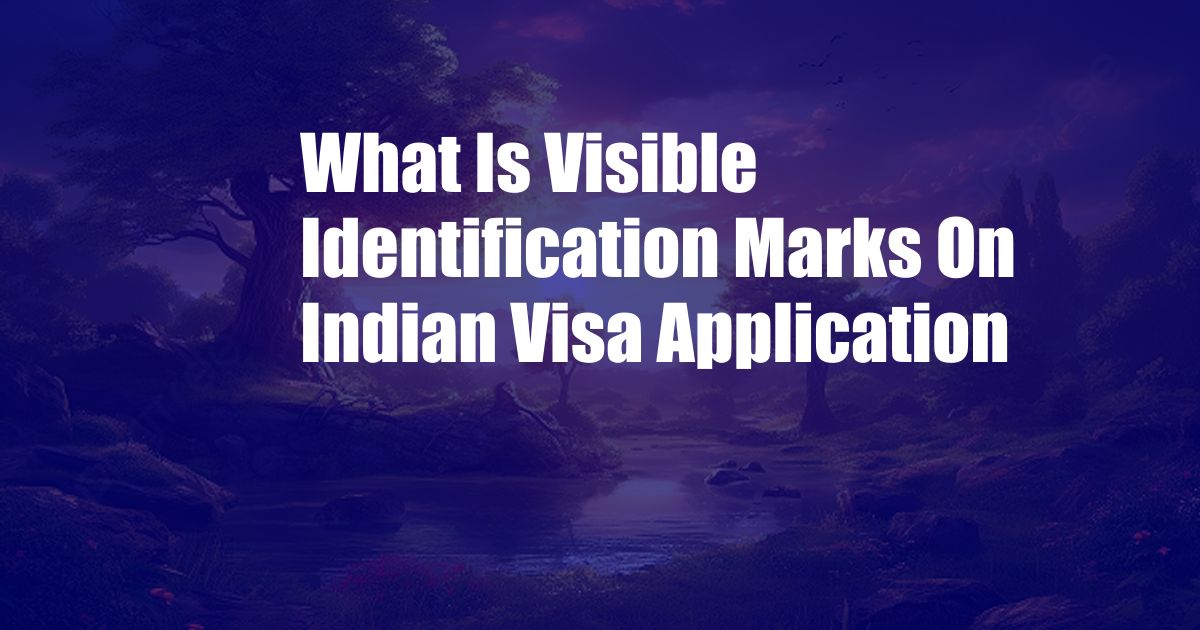
Introduction to Visible Identification Marks on Indian Visa Applications
As an Indian citizen embarking on international adventures, securing a visa is a crucial step. One essential aspect of this process is providing accurate information, including details of any visible identification marks. These marks serve as unique identifiers and play a significant role in ensuring seamless border crossings and enhanced security measures.
This comprehensive guide will delve into the concept of visible identification marks, their importance in visa applications, and the latest practices surrounding their declaration. Whether you’re a frequent traveler or a first-time applicant, this guide will equip you with the knowledge and tools to navigate this crucial aspect of your visa application.
Visible Identification Marks: Definition and Importance
Visible identification marks are distinctive physical characteristics that can aid in identifying an individual. These marks can include scars, birthmarks, moles, tattoos, or any other permanent or semi-permanent features that are readily noticeable.
Including visible identification marks on visa applications is imperative for several reasons. Firstly, they provide additional verification of the applicant’s identity, especially when combined with biometric data such as fingerprints and facial recognition. This helps prevent fraud and identity theft, ensuring the integrity of the visa process.
Recent Trends and Developments
In recent years, there has been a growing emphasis on the accuracy and completeness of visible identification mark declarations. Embassies and consulates are adopting advanced technologies, such as biometric scanners and facial recognition software, to cross-reference the information provided by applicants.
Additionally, there is an increasing focus on consistency in the declaration of visible identification marks across different visa applications. Applicants are advised to provide consistent information when applying for multiple visas to avoid discrepancies that may delay or hinder their applications.
Tips and Expert Advice for Accurate Declarations
To ensure your visa application is processed smoothly, here are some tips and expert advice for accurately declaring visible identification marks:
- Thoroughly examine your body for any visible marks, including scars, birthmarks, moles, and tattoos.
- Take clear and well-lit photographs of each mark, ensuring they are close-up and in focus.
- Describe each mark in detail, including its size, shape, color, and location on your body.
- If possible, obtain a doctor’s certificate or medical record that verifies the existence and nature of any significant marks.
- Be consistent in your declaration across different visa applications to avoid discrepancies.
By following these tips, you can increase the accuracy and completeness of your visible identification mark declaration, enhancing the security and efficiency of your visa application process.
FAQ on Visible Identification Marks on Visa Applications
Q: What types of visible identification marks are required to be declared on a visa application?
A: Any visible mark that is permanent or semi-permanent, such as scars, birthmarks, moles, or tattoos, should be declared.
Q: How can I ensure that my visible identification marks are described accurately on my visa application?
A: Take clear photographs of each mark, describe them in detail, and consider obtaining a doctor’s certificate or medical record for verification, if necessary.
Q: What are the consequences of providing inaccurate information about visible identification marks on a visa application?
A: Inaccurate declarations may delay or hinder your visa application, or even result in denial.
Conclusion
Visible identification marks play a crucial role in Indian visa applications, serving as unique identifiers and enhancing security measures. By accurately declaring these marks, applicants can ensure a smooth and efficient visa application process. Remember, providing complete and accurate information is essential to avoid delays and potential complications.
If you have any further questions or need additional support regarding visible identification marks on Indian visa applications, consult the official embassy or consulate website or seek professional advice.